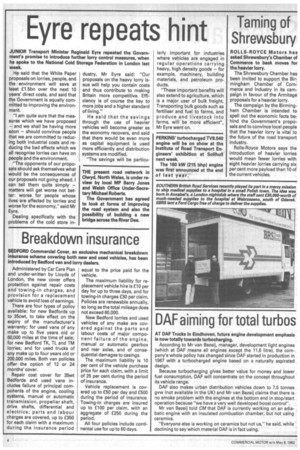Eyre repeats hint
Page 4

If you've noticed an error in this article please click here to report it so we can fix it.
JUNIOR Transport Minister Reginald Eyre repeated the Government's promise to introduce further lorry control measures, when he spoke to the National Cold Storage Federation in London last week.
He said that the White Paper proposals on lorries, people, and the environment will save at least £1.5bn over the next 10 years' direct costs, and said that the Government is equally committed to improving the environment.
"I am quite sure that the measures which we have proposed — and we shall be having more soon — should convince people that we are committed to reducing both industrial costs and reducing the bad effects which we all recognise lorries can have on people and the environment.
"The opponents of our proposals should ask themselves what would be the consequences of our proposals not going ahead. I can tell them quite simply — matters will get worse not better: worse for people whose lives are affected by lorries and worse for the economy," said Mr Eyre.
Dealing specifically with the problems of the cold store in dustry, Mr Eyre said: "Our proposals on the heavy lorry issue will help you contain costs and thus contribute to making Britain more competitive. Efficiency is of course the key to more jobs and a higher standard of living."
He said that the savings through the use of heavier vehicles will become greater as the economy recovers, and said that there would be even more as capital equipment is used more efficiently and distribution systems are modified.
"The savings will be particu larly important for industries where vehicles are engaged in regular operations carrying heavy, high density goods — for example, machinery, building materials, and petroleum products.
"These important benefits will also extend to agriculture, which is a major user of bulk freight. Transporting bulk goods such as fertiliser and fuel to farms, and produce and livestock into farms, will be more efficient", Mr Eyre went on.




























































